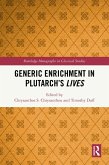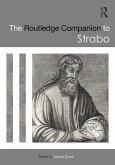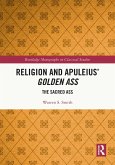Pushing the Boundaries of Historia (eBook, PDF)
Redaktion: English, Mary; Fratantuono, Lee
44,95 €
44,95 €
inkl. MwSt.
Sofort per Download lieferbar

22 °P sammeln
44,95 €
Als Download kaufen

44,95 €
inkl. MwSt.
Sofort per Download lieferbar

22 °P sammeln
Jetzt verschenken
Alle Infos zum eBook verschenken
44,95 €
inkl. MwSt.
Sofort per Download lieferbar
Alle Infos zum eBook verschenken

22 °P sammeln
Pushing the Boundaries of Historia (eBook, PDF)
Redaktion: English, Mary; Fratantuono, Lee
- Format: PDF
- Merkliste
- Auf die Merkliste
- Bewerten Bewerten
- Teilen
- Produkt teilen
- Produkterinnerung
- Produkterinnerung

Bitte loggen Sie sich zunächst in Ihr Kundenkonto ein oder registrieren Sie sich bei
bücher.de, um das eBook-Abo tolino select nutzen zu können.
Hier können Sie sich einloggen
Hier können Sie sich einloggen
Sie sind bereits eingeloggt. Klicken Sie auf 2. tolino select Abo, um fortzufahren.

Bitte loggen Sie sich zunächst in Ihr Kundenkonto ein oder registrieren Sie sich bei bücher.de, um das eBook-Abo tolino select nutzen zu können.
This collection of essays, written by philologists, historians, epigraphers, palaeographers, archaeologists, and art historians, brings together the best of old and new traditions of classical study, from senior emeritus faculty with established records of scholarly productivity, to the newest generation of classics and archaeology professors.
- Geräte: PC
- mit Kopierschutz
- eBook Hilfe
- Größe: 41.51MB
Andere Kunden interessierten sich auch für
![Pushing the Boundaries of Historia (eBook, ePUB) Pushing the Boundaries of Historia (eBook, ePUB)]() Pushing the Boundaries of Historia (eBook, ePUB)44,95 €
Pushing the Boundaries of Historia (eBook, ePUB)44,95 €![Generic Enrichment in Plutarch's Lives (eBook, PDF) Generic Enrichment in Plutarch's Lives (eBook, PDF)]() Generic Enrichment in Plutarch's Lives (eBook, PDF)44,95 €
Generic Enrichment in Plutarch's Lives (eBook, PDF)44,95 €![The Routledge Companion to Strabo (eBook, PDF) The Routledge Companion to Strabo (eBook, PDF)]() The Routledge Companion to Strabo (eBook, PDF)48,95 €
The Routledge Companion to Strabo (eBook, PDF)48,95 €![Body Behaviour and Identity Construction in Ancient Greek and Roman Literature (eBook, PDF) Body Behaviour and Identity Construction in Ancient Greek and Roman Literature (eBook, PDF)]() Andreas SerafimBody Behaviour and Identity Construction in Ancient Greek and Roman Literature (eBook, PDF)44,95 €
Andreas SerafimBody Behaviour and Identity Construction in Ancient Greek and Roman Literature (eBook, PDF)44,95 €![Gore Vidal and Antiquity (eBook, PDF) Gore Vidal and Antiquity (eBook, PDF)]() Quentin BroughallGore Vidal and Antiquity (eBook, PDF)41,95 €
Quentin BroughallGore Vidal and Antiquity (eBook, PDF)41,95 €![Three Ancient Geographical Treatises in Translation (eBook, PDF) Three Ancient Geographical Treatises in Translation (eBook, PDF)]() Duane W. RollerThree Ancient Geographical Treatises in Translation (eBook, PDF)40,95 €
Duane W. RollerThree Ancient Geographical Treatises in Translation (eBook, PDF)40,95 €![Religion and Apuleius' Golden Ass (eBook, PDF) Religion and Apuleius' Golden Ass (eBook, PDF)]() Warren S. SmithReligion and Apuleius' Golden Ass (eBook, PDF)40,95 €
Warren S. SmithReligion and Apuleius' Golden Ass (eBook, PDF)40,95 €-
-
-
This collection of essays, written by philologists, historians, epigraphers, palaeographers, archaeologists, and art historians, brings together the best of old and new traditions of classical study, from senior emeritus faculty with established records of scholarly productivity, to the newest generation of classics and archaeology professors.
Dieser Download kann aus rechtlichen Gründen nur mit Rechnungsadresse in A, B, BG, CY, CZ, D, DK, EW, E, FIN, F, GR, HR, H, IRL, I, LT, L, LR, M, NL, PL, P, R, S, SLO, SK ausgeliefert werden.
Produktdetails
- Produktdetails
- Verlag: Taylor & Francis eBooks
- Seitenzahl: 314
- Erscheinungstermin: 19. November 2018
- Englisch
- ISBN-13: 9781351695008
- Artikelnr.: 54673375
- Verlag: Taylor & Francis eBooks
- Seitenzahl: 314
- Erscheinungstermin: 19. November 2018
- Englisch
- ISBN-13: 9781351695008
- Artikelnr.: 54673375
- Herstellerkennzeichnung Die Herstellerinformationen sind derzeit nicht verfügbar.
Mary C. English is currently Professor of Classics and General Humanities at Montclair State University, USA. In addition to publishing articles on Aristophanes as well as on the reception of Greek tragedy, she is the co-author, with Georgia L. Irby, of A Little Latin Reader (2011; 2nd ed. 2017) and A New Latin Primer (2015). Lee M. Fratantuono is Professor and Chair of Classics at Ohio Wesleyan University, USA. Among other works on Latin literature and Roman history, he is the co-editor Aeneid 5 (2015) and Aeneid 8 (2018).
List of contributors; Preface and acknowledgements; Introduction, Mary C.
English and Lee M. Fratantuono; Part I: Herodotean narratives and
cross-cultural comparisons; Chapter 1: Different ways of saying historia
in the prose of Herodotus and Thucydides, Gregory Nagy; Chapter 2: Tyrants'
spectacles in Herodotus, Deborah Boedeker; Chapter 3: Thinking with Sima
Qian's Shiji about Herodotus' fragmented narrative of the story of
Miltiades, Thomas R. Martin; Chapter 4: Settling family feuds: Lysias 1 and
Herodotus' Lydians, Nina C. Coppolino; Chapter 5: East and West in the
Histories of Herodotus and Tacitus, Timothy Joseph; Part II. Historia and
the ancient world; Chapter 6: Thucydides' use of Homer in his Archaeology,
Mary Ebbott; Chapter 7: Models of gift-exchange and practices of
hostage-giving and hostage-taking in classical Persian poetry, Olga M.
Davidson; Chapter 8: Michael Ventris, Sterling Dow, and the initial
reception of the decipherment of Linear B, Stephen Tracy; Chapter 9:
Citizen scholarship in the Homer Multitext project, Neel Smith; Part III:
The development and reception of historical exempla; Chapter 10: Othryadas:
The development of a historical and literary exemplum, Alissa Vaillancourt
and Andrew G. Scott; Chapter 11: No peeking! Athena and Alcibiades, Joseph
Falaky Nagy; Chapter 12: A furious fury: Virgil's Camilla, Livy's Camillus,
and the reconciliations of Juno, Lee M. Fratantuono; Chapter 13: Ovid's
autobiography (Tr. 4.10): Poetic identity and immortality in the poetry of
exile, Matthew M. McGowan; Chapter 14: Billy Collins as a modern-day Ovid:
An Ovidian reading of Collins' Ballistics, Jill A. Coyle; Part IV: Fury,
honor, and historia: Conflict and struggle in the Greek and Roman
imaginations; Chapter 15: Sound effects: Aural aspects of Euripides'
Bacchae, Katie Lamberto; Chapter 16: Evander's love of gore and bloodshed
in Aeneid 8, James J. O'Hara; Chapter 17: A disquiet follows my soul: Civil
war in Livy Book 1, Mark J. B. Wright; Chapter 18: Saint Pilate and the
conversion of Tiberius, Paul F. Burke; Chapter 19: Julius Caesar in the
1960s: Jerome Kilty's stage adaptation of Thornton Wilder's The Ides of
March, Mary C. English; Chapter 20: Edward Robinson's plaster casts and the
battle for the Museum of Fine Arts, Ellen E. Perry; Index
English and Lee M. Fratantuono; Part I: Herodotean narratives and
cross-cultural comparisons; Chapter 1: Different ways of saying historia
in the prose of Herodotus and Thucydides, Gregory Nagy; Chapter 2: Tyrants'
spectacles in Herodotus, Deborah Boedeker; Chapter 3: Thinking with Sima
Qian's Shiji about Herodotus' fragmented narrative of the story of
Miltiades, Thomas R. Martin; Chapter 4: Settling family feuds: Lysias 1 and
Herodotus' Lydians, Nina C. Coppolino; Chapter 5: East and West in the
Histories of Herodotus and Tacitus, Timothy Joseph; Part II. Historia and
the ancient world; Chapter 6: Thucydides' use of Homer in his Archaeology,
Mary Ebbott; Chapter 7: Models of gift-exchange and practices of
hostage-giving and hostage-taking in classical Persian poetry, Olga M.
Davidson; Chapter 8: Michael Ventris, Sterling Dow, and the initial
reception of the decipherment of Linear B, Stephen Tracy; Chapter 9:
Citizen scholarship in the Homer Multitext project, Neel Smith; Part III:
The development and reception of historical exempla; Chapter 10: Othryadas:
The development of a historical and literary exemplum, Alissa Vaillancourt
and Andrew G. Scott; Chapter 11: No peeking! Athena and Alcibiades, Joseph
Falaky Nagy; Chapter 12: A furious fury: Virgil's Camilla, Livy's Camillus,
and the reconciliations of Juno, Lee M. Fratantuono; Chapter 13: Ovid's
autobiography (Tr. 4.10): Poetic identity and immortality in the poetry of
exile, Matthew M. McGowan; Chapter 14: Billy Collins as a modern-day Ovid:
An Ovidian reading of Collins' Ballistics, Jill A. Coyle; Part IV: Fury,
honor, and historia: Conflict and struggle in the Greek and Roman
imaginations; Chapter 15: Sound effects: Aural aspects of Euripides'
Bacchae, Katie Lamberto; Chapter 16: Evander's love of gore and bloodshed
in Aeneid 8, James J. O'Hara; Chapter 17: A disquiet follows my soul: Civil
war in Livy Book 1, Mark J. B. Wright; Chapter 18: Saint Pilate and the
conversion of Tiberius, Paul F. Burke; Chapter 19: Julius Caesar in the
1960s: Jerome Kilty's stage adaptation of Thornton Wilder's The Ides of
March, Mary C. English; Chapter 20: Edward Robinson's plaster casts and the
battle for the Museum of Fine Arts, Ellen E. Perry; Index
List of contributors; Preface and acknowledgements; Introduction, Mary C.
English and Lee M. Fratantuono; Part I: Herodotean narratives and
cross-cultural comparisons; Chapter 1: Different ways of saying historia
in the prose of Herodotus and Thucydides, Gregory Nagy; Chapter 2: Tyrants'
spectacles in Herodotus, Deborah Boedeker; Chapter 3: Thinking with Sima
Qian's Shiji about Herodotus' fragmented narrative of the story of
Miltiades, Thomas R. Martin; Chapter 4: Settling family feuds: Lysias 1 and
Herodotus' Lydians, Nina C. Coppolino; Chapter 5: East and West in the
Histories of Herodotus and Tacitus, Timothy Joseph; Part II. Historia and
the ancient world; Chapter 6: Thucydides' use of Homer in his Archaeology,
Mary Ebbott; Chapter 7: Models of gift-exchange and practices of
hostage-giving and hostage-taking in classical Persian poetry, Olga M.
Davidson; Chapter 8: Michael Ventris, Sterling Dow, and the initial
reception of the decipherment of Linear B, Stephen Tracy; Chapter 9:
Citizen scholarship in the Homer Multitext project, Neel Smith; Part III:
The development and reception of historical exempla; Chapter 10: Othryadas:
The development of a historical and literary exemplum, Alissa Vaillancourt
and Andrew G. Scott; Chapter 11: No peeking! Athena and Alcibiades, Joseph
Falaky Nagy; Chapter 12: A furious fury: Virgil's Camilla, Livy's Camillus,
and the reconciliations of Juno, Lee M. Fratantuono; Chapter 13: Ovid's
autobiography (Tr. 4.10): Poetic identity and immortality in the poetry of
exile, Matthew M. McGowan; Chapter 14: Billy Collins as a modern-day Ovid:
An Ovidian reading of Collins' Ballistics, Jill A. Coyle; Part IV: Fury,
honor, and historia: Conflict and struggle in the Greek and Roman
imaginations; Chapter 15: Sound effects: Aural aspects of Euripides'
Bacchae, Katie Lamberto; Chapter 16: Evander's love of gore and bloodshed
in Aeneid 8, James J. O'Hara; Chapter 17: A disquiet follows my soul: Civil
war in Livy Book 1, Mark J. B. Wright; Chapter 18: Saint Pilate and the
conversion of Tiberius, Paul F. Burke; Chapter 19: Julius Caesar in the
1960s: Jerome Kilty's stage adaptation of Thornton Wilder's The Ides of
March, Mary C. English; Chapter 20: Edward Robinson's plaster casts and the
battle for the Museum of Fine Arts, Ellen E. Perry; Index
English and Lee M. Fratantuono; Part I: Herodotean narratives and
cross-cultural comparisons; Chapter 1: Different ways of saying historia
in the prose of Herodotus and Thucydides, Gregory Nagy; Chapter 2: Tyrants'
spectacles in Herodotus, Deborah Boedeker; Chapter 3: Thinking with Sima
Qian's Shiji about Herodotus' fragmented narrative of the story of
Miltiades, Thomas R. Martin; Chapter 4: Settling family feuds: Lysias 1 and
Herodotus' Lydians, Nina C. Coppolino; Chapter 5: East and West in the
Histories of Herodotus and Tacitus, Timothy Joseph; Part II. Historia and
the ancient world; Chapter 6: Thucydides' use of Homer in his Archaeology,
Mary Ebbott; Chapter 7: Models of gift-exchange and practices of
hostage-giving and hostage-taking in classical Persian poetry, Olga M.
Davidson; Chapter 8: Michael Ventris, Sterling Dow, and the initial
reception of the decipherment of Linear B, Stephen Tracy; Chapter 9:
Citizen scholarship in the Homer Multitext project, Neel Smith; Part III:
The development and reception of historical exempla; Chapter 10: Othryadas:
The development of a historical and literary exemplum, Alissa Vaillancourt
and Andrew G. Scott; Chapter 11: No peeking! Athena and Alcibiades, Joseph
Falaky Nagy; Chapter 12: A furious fury: Virgil's Camilla, Livy's Camillus,
and the reconciliations of Juno, Lee M. Fratantuono; Chapter 13: Ovid's
autobiography (Tr. 4.10): Poetic identity and immortality in the poetry of
exile, Matthew M. McGowan; Chapter 14: Billy Collins as a modern-day Ovid:
An Ovidian reading of Collins' Ballistics, Jill A. Coyle; Part IV: Fury,
honor, and historia: Conflict and struggle in the Greek and Roman
imaginations; Chapter 15: Sound effects: Aural aspects of Euripides'
Bacchae, Katie Lamberto; Chapter 16: Evander's love of gore and bloodshed
in Aeneid 8, James J. O'Hara; Chapter 17: A disquiet follows my soul: Civil
war in Livy Book 1, Mark J. B. Wright; Chapter 18: Saint Pilate and the
conversion of Tiberius, Paul F. Burke; Chapter 19: Julius Caesar in the
1960s: Jerome Kilty's stage adaptation of Thornton Wilder's The Ides of
March, Mary C. English; Chapter 20: Edward Robinson's plaster casts and the
battle for the Museum of Fine Arts, Ellen E. Perry; Index







